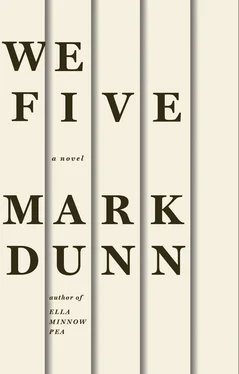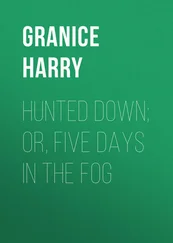“I’d wondered what had happened to you,” said Molly through a sigh of relief.
“I couldn’t find our friend Mr. Prowse for the longest time. He’d stepped away from the telegraph office to take a morning stroll with his new bride. But here he is. And there she is! Hallo! Hallo!” Mrs. Colthurst waved her handkerchief. “We thought we’d lost you, my dear,” she called.
The “new bride,” Mirabella Prowse, waved her hand in acknowledgment of the hail as she squeezed and wormed her way to join her childhood friend Molly and the others standing in a ring round Miss Spalding upon her crate, as children will do when reciting the “Ring-a-ring o’ roses” rhyme of old.
Mrs. Colthurst resumed: “Mr. Prowse, do tell Miss Spalding exactly what you told me. Jemma, dear, you must listen to Mr. Prowse. He operates the telegraph but is also a very learned man — an astronomer. He knows quite a bit about the sun.”
Reginald Prowse stepped forward and put himself directly in front of Jemma Spalding, who studied him curiously as if he had more eyes than two, or perhaps horns sprouting from his head. “My dear girl, you should know that a star — and our sun is a star — doesn’t simply get the notion one day to blow itself up without warning.”
“Oh, there is to be a warning,” countered Jemma with a brisk bobbing of the head. “There will be beautiful lights in the sky. They will brighten the world to give us all time to say good-bye to one another without our having to ignite a single candle.”
“Those lights you describe are called auroras. They are quite lovely to look at, but in my long acquired knowledge of helionomy, they have never presaged any sort of destructive solar activity — let alone that auroras would ever prefigure the fiery death of the sun itself. It makes no scientific sense.” (Mr. Prowse wished to characterise such thinking as “sheer lunacy,’’ but in spite of the cleverness of the subtle celestial comparison, he did not wish to imply that Jemma Spalding was a lunatic.)
“And yet it is what I have been told,” replied Jemma, unpersuaded. “The beautiful lights: red and green and violet. And then the great explosion that will come in a blink of an eye and put to quick flame every planet in its orbit. A blaze of igneous glory.”
“ Glory ?”asked Mirabella.
“Glory in that those who are in God’s good grace will be transported in that moment into His supernal arms.”
Mirabella nodded (to be polite). Prowse sighed and shrugged his shoulders, then conferred a look of utter helplessness to Mobry and to Molly and to Mrs. Colthurst, and even to his new wife, for whose especial benefit he appended a wink and a little smile which said, “We shall resume our lover’s ramble shortly, my love, once my duty here is done.”
Mrs. Colthurst placed a hand upon Jemma’s. “Let us go, you and Molly and I, and have a soothing cup of violet tea at my dress shop. Our nerves are all so frayed, my bonny child, and yours must be worn to a frazzle with this heavy burden you’ve taken up.”
“I shall be rewarded in Heaven for every soul I save,” Jemma nobly replied, “ but I will take tea for now. I’m very thirsty, and my throat is parched.”
Mrs. Colthurst handed Jemma down from the wooden crate whilst mouthing “Thank you” to Mr. and Mrs. Prowse. Then she whispered, “All will be well” to Mr. Mobry, and the crowd parted to let the three women pass, with Molly shaking her head and saying, “Oh Jemma, Jemma, Jemma” in a weary underbreath whilst wondering if there was even an ounce of truth to what her cousin had said. Because, after all, Molly herself had wondered at times how the world should end. Would it come with angels singing in beautiful Heavenly chorus and clouds opening to reveal gates of opal and pearl? Or would it terminate in some great orgy of destruction and then be succeeded in its aftermath by nothing but darkness and infinite quietude?
Molly shivered in consideration of the latter scene. And then she found herself steeped in sadness, for any prospect that did not put her together for eternity with her beloved Pat or her troubled father, for whom there was so much that still wanted to be said and mended, or her four circle-sisters, who were like extensions of her very own self, was an outcome too tragic for her even to contemplate.
It came to pass that Molly did not have tea and biscuits with Mrs. Colthurst and her temporarily docile cousin Jemma, for when they arrived at the shop Carrie was waiting there to take Molly to Higgins’ Emporium. Molly had not heard what had happened to Tom Catts and who it was who’d done it to him, and the intelligence sickened and crumpled her.
Carrie was frightened by what Holborne and Castle might do in retaliation, not only to Lyle but to all of We Five. What Carrie did not know — what none of the circle-sisters knew — was that Jerry Castle was preparing to betake himself to Manchester, to put himself back into the fold of his adoptive father, the cheesemonger, and his adoptive mother. But first, Jerry Castle wished to bid good-bye to the woman who bore him and who he knew he should never see again. When the day before he had fled from her house and run and run and thrown himself into a farmer’s stew pond in shame, he had thought only of the ardency of the feelings he had owned for the girl who turned out to be his sister. Now he came to regret the fact that he had not engaged her mother— his mother — the woman who had foisted him upon the world and nursed him at her breast…and then cruelly tossed him to the winds of fate.
It was an interview he now most urgently wished to have before he left Tulleford. And it would take place whether or no that woman wished it.
San Francisco, April 1906
Clara Barton set her valise upon the bed and walked over to the mahogany wardrobe. As she was about to open its doors she noticed out the window, a flock of seagulls circling lazily in the bright afternoon sky. Clara never tired of her crisp “springtime” view of the city from this window, unobscured by rain and fog. She had lived here upon the near-summit of Washington Street hill for all her years in San Francisco. John Barton had chosen this third-story flat for its sweeping prospect — one of the best spots in San Francisco for taking in this rolling, terraced city in full panoply, as well as the scenic landscape that lay beyond. Pacific Heights was Johnny’s gift to his young bride. It was given to her at a time in which she felt he loved her and wanted only the best things for her.
Though the view continued to enchant and inspire her, the same could not be said for the man responsible for it.
And now there was another man who had offered Clara his heart — a beautiful gift that had unfortunately become desecrated, even in this early season, by tragic circumstance.
Clara went to the window. She sat down on the cushioned built-in seat her daughter so frequently occupied. From here one could see San Francisco Bay and the shore of Contra Costa. Laid out before her: the great city of Oakland and its neighbor, Berkeley, and across the bay, the sleepy fishing villages of Tiburon and Sausalito. Towering in the distance were the majestic crests of Mount Diablo and Mount Tamalpais. In the foreground: the green tidewaters of the narrow Golden Gate inlet.
Clara looked down at the jumble of roofs that descended, in stair-step fashion, the precipitous slope below. Then came a great confusion of chimneys and cupolas and still more roofs, both gently and steeply pitched. These houses possessed all the architectural ornamentation — the windows in triplicate in a Serlian motif, the arches and dentils and oriels and gables, the classical columns and terracotta panels and gingerbread tiles and fish-scale shingles — of the Queen Anne style — an idiom marked by a predominance of wood and brick and slate in colorful and fussily constructed idiosyncrasy that gave Clara to think on occasion of the Queen herself coming and waving her magical architectural wand and transforming the city into a storybook for the eye. Clara imprinted the scene before her onto the pages of her memory, even as she knew it could not hold. A perched gull, the feathery top of a lone Canary Island date palm, a solitary sailing ship in the Bay, Goat Island in the distance — these things individually she would remember; yet the scene in aggregate would blur over time — would blur and fade even if the canvas were not about to be ripped from the wall altogether by means of geoseismic catastrophe.
Читать дальше












